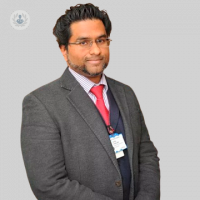What is aortic stenosis, and why is it so important to treat it?
Written in association with:Here, in this article below, revered consultant cardiologist, Dr Raj Chelliah, discusses aortic stenosis at length, telling us all about the causes, symptoms, and diagnosis process related to the condition.

What is aortic stenosis?
Aortic stenosis is a condition that occurs when the aortic valve narrows and fails to open fully. This then obstructs blood flow from the heart to the aorta and the rest of the body.
What are the causes and risk factors?
Aortic stenosis is more common as we age. Risk factors include high blood pressure, abnormal lipid levels, diabetes, and chronic kidney disease. Genetic predisposition may also play a role.
What are the symptoms of aortic stenosis?
In the early stages of the condition, patients may experience shortness of breath and chest pain. As the disease progresses, it can lead to heart failure, sudden loss of consciousness, and even sudden death.
How is aortic stenosis diagnosed?
Physicians listen for heart murmurs using a stethoscope. Imaging tests, such as echocardiograms, help visualise the valve and assess its function.
What are the most effective treatment options?
Mild cases may not require immediate intervention. Severe aortic stenosis normally requires surgical repair or valve replacement surgery. Transcatheter aortic valve implantation (TAVI) is a less invasive option for high-risk patients.
In terms of prevention and management of aortic stenosis, what should I do?
Regular check-ups are crucial, especially for older adults. Lifestyle modifications, such as managing blood pressure and cholesterol, can help prevent progression.
What is the outlook like for someone with aortic stenosis?
The outlook for someone with aortic stenosis depends mostly on whether or not they are experiencing symptoms. You can have aortic stenosis for 10 to 20 years without any symptoms.
However, once symptoms show up, progression can be rapid, and treatment becomes urgent. Without treatment, this condition can become life-threatening.
To schedule an appointment with Dr Raj Chelliah, simply head on over to his Top Doctors profile.


